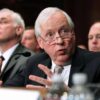Introduction
Big U.S. banks are among the harshest critics of the Consumer Financial Protection Bureau, but they stand to benefit from a CFPB crackdown on risky products, which would limit the banks’ future credit and litigation costs, according to a major credit rating agency.
In a new report, Moody’s Investors Service called the CFPB a “medicine” which could reduce the number of risks that banks take, according to the New York Times’ Dealbook. The CFPB will also help U.S. banks by extending regulation to their non-banking financial companies and thus “level[ing] the playing field.”
But Moody’s also acknowledged that the CFPB – which has the power to enforce consumer protection laws at 110 of the biggest U.S. banks – may cut into profits by reducing banking fees and tightening mortgage servicing standards.
“Certain elements of the C.F.P.B. are credit negative for large U.S. banks, in particular those with substantial mortgage operations,” Moody’s said. “Such firms are likely to be confronted by new national standards and attendant compliance-related costs related to mortgage servicing.”
FDIC, Comptroller nominees – Thomas Curry, the White House choice to head the banking regulatory agency that oversees the nation’s biggest banks, on Tuesday endorsed “strong capital levels” for banks at his Senate confirmation hearing.
Curry’s comments were notably tougher than recent remarks by current Comptroller of the Currency, John Walsh, who was widely criticized by Democrats last month after he called for restraint in forcing big banks to add to their capital cushions. “Having strong capital levels in place in advance of an economic downturn is critically important,” Curry told the Senate Banking Committee, according to MarketWatch.
“Economic recovery and prosperity requires a healthy, independently regulated banking system that has both the financial capacity and confidence to extend credit to individuals and businesses,” Curry said in his written testimony.
Also testifying was Martin Gruenberg, the nominee for chairman of the Federal Deposit Insurance Corp. and now the acting head of the agency.
New SEC rules for banks, hedge funds – The Securities and Exchange Commission unanimously approved on Tuesday a new rule to track trading by the biggest market players such as banks and hedge funds.
The rules are part of the SEC’s efforts to help level the playing field for investors and increase market transparency after the flash crash of May 2010. That month saw the Dow Jones Industrial Average plunge some 700 points before rebounding, and exposed weaknesses in the regulatory system.
Under the new rule, the SEC will assign large traders a unique ID number, which must be used by their broker-dealers in transaction records and reported to the SEC upon request. “This new rule will enable us to promptly and efficiently identify significant market participants and collect data on their trading activity so that we can reconstruct market events, conduct investigations, and bring enforcement actions as appropriate,” SEC Chairman Mary Schapiro said.
Read more in Inequality, Opportunity and Poverty
Finance
Credit rating execs short on debt plan specifics for small audience at House hearing
S&P president says downgrade not the same as default
Finance
Financial stability council warns Congress U.S. markets still fragile
Your Wall Street reform reading list for today




Join the conversation
Show Comments